MOST MEMORABLE MOMENTS... TRACK & FIELD
Alice Coachman Ralph Boston Wilma Rudolph NCCU Bob Hayes Edwin Moses Others
Alice Coachman Shines in Her First Olympics
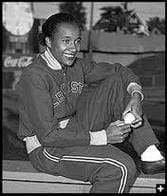
For a decade, Alice Coachman dominated the women’s high jump event and doubled as a world-class sprinter, too. At Tuskegee, she flourished under her mentor and legendary pioneer coach Cleve Abbott. Coachman was a nine-time AAU outdoor high jump champion (1939-48) and was an indoor champion in 1941, 1945 and 1946 (there was no indoor competition from 1938-40 and from 1942-44).
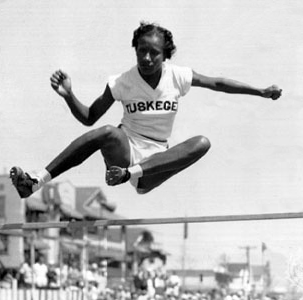
Ralph Boston Leaps into History

On August 12, 1960, Ralph Boston leaped 26 feet, 11 1/2 in the long jump (breaking the mark set by Jesse Owens twenty-five years earlier) which was the first of five world records he went on to set in the long jump. Less than a month later in the Olympic Games in Rome, Boston broke Owen’s twenty-four-year-old Olympic record by jumping 25 feet, 7 1/2 inches to win the gold medal, the first time four competitors broke the 26 feet barrier in the same meet.
In May 1961, Ralph broke his own record with a leap of 27 feet, 1/2 inch, becoming the first to leap more than 27 feet. A year later, he set another record of 27 feet, 2 inches. After the Soviet Union’ Igor Ter-Ovanesyan set a new record of 27 feet, 3 1/2 inches in 1962, Boston tied the mark in August 1964 and broke it with a jump if 27 feet, 4 1/2 inches in 1965. He set his last world record of 27 feet, 5 inches in 1965.
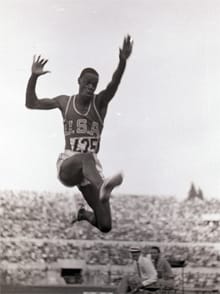
La Gazzella Nera: Wilma Rudolph

one of the most celebrated female athletes of all time
On September 7th, 1960, at the Rome Olympics, Wilma Rudolph became the first American woman to win 3 gold medals in the Olympics and was crowned the fastest woman in the world.
She won the 100-meter dash, the 200-meter dash, and ran the anchor on the 400-meter relay team. When she retired from competition at the peak of her athletic career in 1962, Rudolph was the world record-holder in the 100- and 200-meter individual events and the 4 × 100-meter relays.

Leroy Walker:
Architect of the Eagles Track Legacy
Dr. Leroy T. Walker, a legend long before he crossed the border from Benedict College in Columbia, South Carolina to the Durham campus built a legacy in men’s track and field at North Carolina Central with a legion of sprinters, hurdlers, and high jumpers.
When Walker retired in 1986 as North Carolina’s chancellor-emeritus, his team won 11 gold medals, 80 athletes were named All-American, and claimed 35 national championships. He became the first black president of the United States Olympic Committee in the 1996 Olympics.


Edwin Roberts

Norman Tate

Larry Black
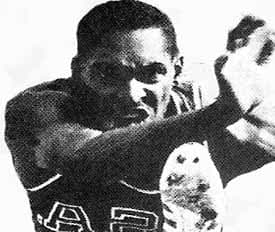
Lee Calhoun

Charles Foster
Edwin Roberts 1963 NCAA Div. II 100-Yd Dash 9.7 220-Yard Dash 20.9 220-Yard Yard 20.8 220-Yard Yard 20.7
Norman Tate 1966 6 Long Jump titles 1966, 1969-71 Triple Jump 1969-79
Larry Black 1971 NCAA II 220 Yard dash record 20.9 2-time Olympic Gold 4X100 Relays /200M 1972 Olympics
Lee Calhoun 1957 Eagles greatest hurdler NCAA II high hurdles title 5 National AAU titles (two indoor/3 outdoor)
Charles Foster 1975 World record holder, high hurdles
Bob Hayes Blazed His Way to Olympic Gold
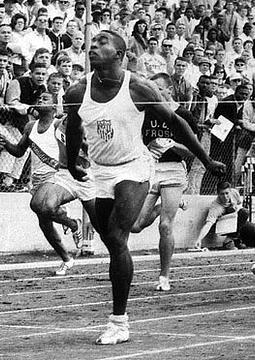
From Matthew Grant High School in Jacksonville, Florida to the 1960 Olympics in Rome, Bob Hayes, the former Florida A&M phenom blazed his way into the history books. Hayes was a star halfback /receiver at FAMU and an All-American sprinter on the men’s track squad. His specialty was speed…the 100M, 200M races where he dominated his college opponents. He was dubbed the “World’s Fastest Human” after winning three national AAU titles, an NCAA title and a three-year ranking as the world’s top 100M champion. He set several records in the 100, 200 and 4X100 relays. Hayes was the first sprinter to break 6.0 seconds in the 60-year dash and the first to run 9.1 seconds in the 100-yard dash.
Hayes also held the world record of 20.5 in the 200M. In 1964, Hayes captured the gold medal in the 100M event at the Olympics and set a new world record (10.06 sec.) and had a margin of seven feet over his nearest opponent. He bettered that performance in the 4X100M Relay finals. Due to poor baton passing, the US team found themselves in fifth place when Hayes, running the anchor leg, took the baton and in one of the most awesome and breath breaking displays of sprinting power, he blew past the competition and was ahead by three meters at the finish line and the U.S. team set a new world record of 39.0.
Edwin Moses: From Cinders to Olympic Gold

Edwin Moses was the only member of the U.S. Track team to win an individual gold medal with his world record performance of 47.64 in the 400M High hurdles at the 1976 Summer Olympics in Montreal, Canada. Moses broke his own world record in the high hurdles with a time of 47.13 in 1980, and again on his birthday in 1981. Moses thrilled a capacity crowd in Oberwerth Stadium in Koblenz, West Germany when he smoked the field in a spectacular 47.02. He won five more U.S. and Olympic Trials titles, three World Cup titles, the 1987 World Championship, and captured another Olympic gold medal in 1984. He won 122 consecutive high hurdle events and still holds 25 of the top 100 fastest times in the 400M hurdles. Hallmarks 400M High Hurdles World Record -67.02 400M High Hurdles Championships: 1976 Olympics -47.64 1977 USA Outdoors -47.43 1984 Olympics -47.02 1987 World Outdoors
...More NCAA, NAIA & Olympic Champions

Rey Robinson
Florida A&M
100M

Wyomia Tyus
Tennessee State
100M

LaShawn Merritt
Norfolk State
400M/4x400M R

Jim Hines
Texas Southern
100M

Madeline Manning
Tennessee State
400–1500 m

Rod Milburn
Southern
110M Hurdles
